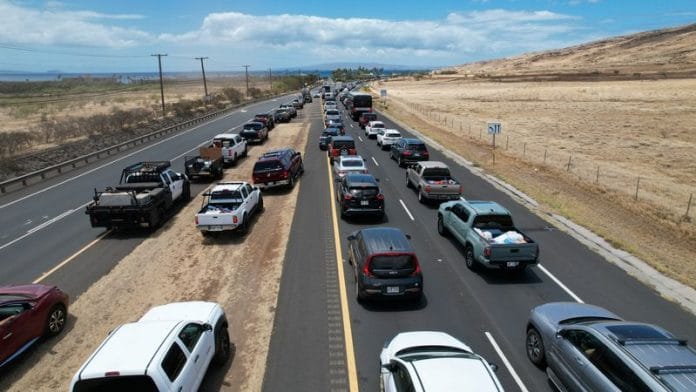By Nate Raymond
(Reuters) – Hawaii on Thursday agreed to settle a lawsuit by 13 young people alleging the U.S. state was violating their rights under its constitution by operating a transportation system that contributes to greenhouse gas emissions and climate change.
Democratic Governor Josh Green announced the “groundbreaking” settlement at a press conference attended by some of the youth activists and lawyers involved in the lawsuit, which they called the first-ever youth-led climate case seeking zero emissions in transportation.
The case had been set for trial on Monday. It would have been the second-ever trial in the U.S. of a lawsuit by young people who claim their futures and health are jeopardized by climate change and that a state’s actions violated their rights.
As part of the settlement, Hawaii will develop a detailed roadmap to achieve the state’s previously set goal of net zero carbon emissions in ground, sea, and interisland air transportation by 2045.
The state’s Department of Transportation will rework its planning processes for ground transportation projects and accelerate efforts to expand a public electric vehicle charging network and improve public transit networks, officials said.
“We’re addressing the impact of climate change today, and needless to say this is a priority because climate change is here,” Green said.
Leinā’ala Ley, a lawyer for the youth activists at Earthjustice, said the “agreement gives Hawaii a boost in our race against climate disaster and offers a model of best practices that other jurisdictions can also implement.”
The case is one of several by young environmental activists in the United States that broadly accuse governments of exacerbating climate change through policies that encourage or allow the extraction and burning of fossil fuels.
The young people, also represented by the nonprofit law firm Our Children’s Trust, claim the policies violate their rights under U.S. or state constitutions.
The cases have raised novel legal claims and have been dismissed by several courts saying that the judiciary could not mandate broad policy changes that are best left to lawmakers and the executive branch.
But the young activists scored a major victory last year when the first such case went to trial in Montana.
In that case, a Montana judge concluded that the Republican-led state’s policies prohibiting regulators from considering the impacts on climate change when approving fossil fuel projects violate the rights of young people.
The lawsuit against Hawaii was filed in 2022 and alleged that the state Department of Transportation was operating a transportation system that ran afoul of state constitutional mandates and impaired their right to a life-sustaining climate.
The plaintiffs, who were 9 to 18 when the case was first filed, said that despite Hawaii being a leader among states in acknowledging the dangers of climate change, was projected to fall significantly short of its own emissions goal.
The lawsuit argued that the state was not only failing to reduce greenhouse gas emissions in the transportation sector but was “heading in the opposite direction,” citing investments in infrastructure like highways as running counter to its goals.
The youth argued that as a result, the state was violating a right guaranteed by the Hawaii Constitution to a clean and healthful environment and its constitutional duty to “conserve and protect Hawaii’s natural beauty and all natural resources.”
The state spent $3 million fighting the case and seeking its dismissal, arguing the zero emissions target and other state laws adopted by the state legislature promoting reduced carbon emissions were “aspirational” and could not form the basis of claiming the state was violating the young people’s rights.
But Judge Jeffrey Crabtree in Honolulu rejected that argument in April 2023, saying the laws required timely planning and action to address climate change and that the state’s inactions had already harmed the plaintiffs.
“Transportation emissions are increasing and will increase at the rate we are going,” Crabtree said. “In other words, the alleged harms are not hypothetical or only in the future. They are current, ongoing, and getting worse.”
(Reporting by Nate Raymond in Boston; Editing by Editing by Alexia Garamfalvi, Sandra Maler and Diane Craft)
Disclaimer: This report is auto generated from the Reuters news service. ThePrint holds no responsibilty for its content.






